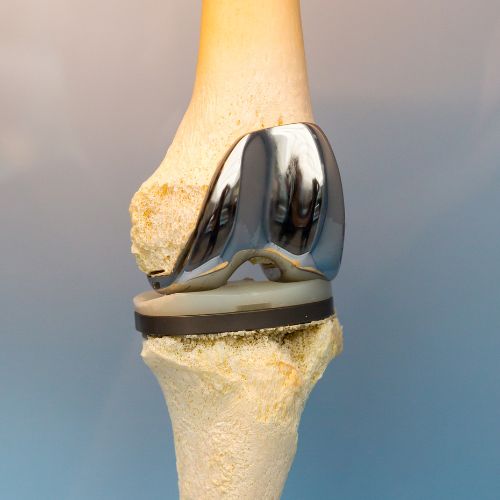Knee Replacement Surgeyr
If ongoing knee problems are reducing your mobility, knee replacement surgery may help by replacing damaged bone and cartilage with implants.
Orthopedic surgeon Dr. Narayan Khandelwal provides tailored care and advanced techniques.
Let’s understand the basic procedure of a total knee replacement surgery :
Getting Ready for Surgery
- Your doctor will measure some important angles in your legs to customize your new knee joint for a good fit.
- You will be asked to do exercises to strengthen and stretch your hip, knee, and ankle before surgery. This helps with recovery.
- Tests like bloodwork, X-rays, and EKGs check your overall health before surgery.
- You may need to stop certain blood-thinning medications a while beforehand to prevent extra bleeding.
During the Knee Replacement
- The surgery exposes the front of the knee. Some quadriceps muscle is detached to reach the joint.
- Damaged cartilage and cruciate ligaments are removed. The surgeon keeps your collateral ligaments for knee stability.
- A metal knee joint is positioned onto the thigh and shin bones using bone cement.
- A plastic cushion is inserted between the metal parts to act as the new cartilage surface.
Technology-Assisted Surgery
- Computers and sensors give information to place the new joint more precisely. Robotic tools also help with accurate positioning.
Pain Control After Surgery
- Numbing medication is injected around the wound during surgery for better post-op pain control.
- Nerve blocks in the legs effectively reduce pain and need for heavy narcotics after your operation is reduced. You may still take pills for pain as needed too.
Some of the main benefits of knee replacement surgery:
Pain Relief
- One of the biggest benefits is a reduction in knee pain from conditions like osteoarthritis
- Most people experience significant pain relief and are able to reduce or stop pain medications
Improved Mobility
- The surgery aims to restore knee mobility and range of motion
- Activities like walking, climbing stairs, standing up become much easier
- Many patients report feeling able to be much more active
Better Quality of Life
- Less pain and improved ability to move around helps daily life activities
- People are better able to work, care for family members, enjoy hobbies
- There can be reduced depression and improved mental health
Independence
- With better mobility and function, independence increases
- Walking aids, wheelchairs, or help from others is needed much less often
Durable Results
- Modern artificial knee joints can last 15-20 years or longer
- Success rates of joint replacement are over 90%
- Revision surgery may be an option later if needed
So in summary – decreased pain, better motion and function, increased activity levels, independence and excellent joint durability make knee replacement an excellent option for those with end-stage arthritis.
Schedule a Consultation with Dr. Narayan Khandelwal
If ongoing knee problems are reducing your quality of life, consider total knee replacement. Call 9920126404 or book online to schedule a consultation to determine if surgery is appropriate.

